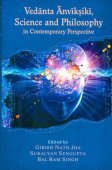Advaita-vedanta, Advaita-vedānta: 2 definitions
Introduction:
Advaita-vedanta means something in Hinduism, Sanskrit. If you want to know the exact meaning, history, etymology or English translation of this term then check out the descriptions on this page. Add your comment or reference to a book if you want to contribute to this summary article.
In Hinduism
Vedanta (school of philosophy)
Source: IEP: Advaita VedantaAdvaita Vedānta is one version of vedānta. Vedānta is nominally a school of Indian philosophy, although in reality it is a label for any hermeneutics that attempts to provide a consistent interpretation of the philosophy of the Upaniṣads or, more formally, the canonical summary of the Upaniṣads, Bādarāyaṇa’s Brahma-sūtra. Advaita is often translated as “non-dualism” though it literally means “non-secondness.” Although Śaṅkara is regarded as the promoter of Advaita Vedānta as a distinct school of Indian philosophy, the origins of this school predate Śaṅkara.
The essential philosophy of Advaita is an idealist monism, and is considered to be presented first in the Upaniṣads and consolidated in the Brahma-sūtra by this tradition. According to Advaita metaphysics, Brahman—the ultimate, transcendent and immanent God of the latter Vedas—appears as the world because of its creative energy (māyā). The world has no separate existence apart from Brahman.

Vedanta (वेदान्त, vedānta) refers to a school of orthodox Hindu philosophy (astika), drawing its subject-matter from the Upanishads. There are a number of sub-schools of Vedanta, however all of them expound on the basic teaching of the ultimate reality (brahman) and liberation (moksha) of the individual soul (atman).
General definition (in Hinduism)
Source: WikiPedia: HinduismAdvaita Vedanta (अद्वैत वेदान्त): A school of Hindu philosophy often called a monistic or non-dualistic system which refers to the indivisibility of the Self (Atman) from the Whole (Brahman).
See also (Relevant definitions)
Partial matches: Advaita, Vedanta.
Full-text (+41): Shankara, Bhamati, Sarvajnatmamuni, Tattvasamiksha, Jadatva, Paricchinnatva, Anumana, Pratyaksha, Mithyatva, Drishyatva, Paksha, Prapanca, Sadhya, Anandabodha, Dharmaraja Adhvarindra, Prakashananda Sarasvati, Vidyaranya, Pramana, Neti-neti, Brahmadvaitavada.
Relevant text
Search found 57 books and stories containing Advaita-vedanta, Advaita-vedānta, Advaitavedānta, Advaitavedanta; (plurals include: vedantas, vedāntas, Advaitavedāntas, Advaitavedantas). You can also click to the full overview containing English textual excerpts. Below are direct links for the most relevant articles:
Shankaracharya and Ramana Maharshi (study) (by Maithili Vitthal Joshi)
A comparative study between Buddhism and Nyaya (by Roberta Pamio)
5.1. Perception of the Universals < [Chapter 4 - The Nyāya Theory of Perception]
1.1. The Nature of Knowledge < [Chapter 1 - The Nature and Criterion of Knowledge]
7. The Sources of Valid Knowledge < [Chapter 1 - The Nature and Criterion of Knowledge]
Bhagavatpadabhyudaya by Lakshmana Suri (study) (by Lathika M. P.)
Śaṅkara’s Metaphysics < [Chapter 3 - References to Śaṅkara’s Philosophy]
The Socio Spiritual Conditions of 8th Century AD < [Chapter 3 - References to Śaṅkara’s Philosophy]
Relation between Jñāna and Bhakti < [Chapter 3 - References to Śaṅkara’s Philosophy]
Contribution of Vachaspati-Mishra to Samkhya System (by Sasikumar. B)
Chapter 2 - Vācaspati Miśra—His life, date and works (introduction)
Chapter 3.3d - The Theory of Satkāryavāda (the doctrine of causality)
Yoga-sutras (Ancient and Modern Interpretations) (by Makarand Gopal Newalkar)
Concept of mokṣa according to Advaita-Vedānta Darśana < [Introduction]
Part 3f - Āstika Darśana (6): Vedānta darśana < [Introduction]
Concept of Mokṣa according to Viśiṣṭādvaita Darśana < [Introduction]
Mahayana Buddhism and Early Advaita Vedanta (Study) (by Asokan N.)
Related products


